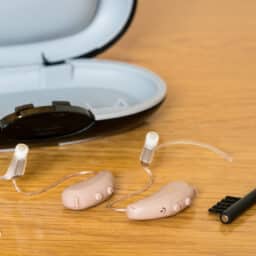Can You Use Hearing Aids on Video Calls?

Hearing aids are a popular and effective tool for individuals with hearing loss. In 2019, the Centers for Disease Control and Prevention (CDC) found that just over 7% of adults 45 years of age and older use hearing aids. Hearing aids can make it easier to process sound in almost any environment, whether you’re listening…
How Are Hearing Loss and Fibromyalgia Connected?

Comorbidity refers to the simultaneous presence of two or more diseases or conditions in one patient. Many common comorbidities are associated with hearing loss, but one infrequently discussed condition is fibromyalgia. What Is Fibromyalgia? Fibromyalgia is a chronic disorder causing musculoskeletal pain, fatigue and issues sleeping, poor cognitive processing and mood issues. Researchers believe fibromyalgia…
How Cleaning Your Hearing Aids Can Prevent Ear Infections

Hearing aids are the most common treatment for individuals with hearing loss. In 2019, the Centers for Disease Control and Prevention (CDC) found that 7.1% of adults aged 45 and older used hearing aids. One of the more important things hearing aid users need to learn is how to care for their devices properly. Not…
Can Ear Infections Cause Hearing Loss?

Middle ear infections are a common condition that many of us experience at some point in our lives, particularly in childhood. Some people experience muffled hearing or hearing loss when they have an ear infection. While hearing loss from an ear infection is almost always temporary, chronic ear infections may increase the risk of permanent…
What’s The Link Between Hearing and the Brain?

Hearing and the brain are closely interconnected. Not only does your brain help you process sounds, but some research has indicated that hearing loss can change how your brain functions. How Your Brain Helps You Hear Sound is first perceived by the ear, where it travels from the outer ear through the middle and into…
Why Does Hearing Aid Discomfort Occur and What Can You Do About It

Hearing aids are small but technologically advanced devices with a microphone that collects sound, an amplifier that raises its volume and a speaker which transmits it directly into the ear canal. The devices can be helpful in improving communication, keeping you more aware of your surroundings and reducing irrelevant noise for a clearer understanding of…
How To Enjoy Music Without Risking Hearing Loss

Exposure to hazardous noise levels is a well-documented cause of hearing loss. With the advent of personal audio devices such as cell phones and in-house speaker systems, people are at more risk than ever for developing noise-induced hearing loss. Knowing how to enjoy your music safely will help ensure you can continue doing so without…
Can Hot Weather Harm Your Hearing Aids?

Hearing aids help you hear your best in any environment, including summertime activities like picnics in the park or playing a round at The Bandit Golf Club. If you’re a hearing aid user, you might be wondering if the hot Texas weather can damage your hearing aids. While it’s true that the heat and humidity…
Is There a Link Between Hearing Aids and Vertigo?

Because vertigo is often linked to inner ear issues, some people wonder if having an object in your ear, like a hearing aid, can cause or worsen symptoms. The good news is that hearing aids cannot cause vertigo and may even work to improve your balance. Understanding Vertigo Vertigo is different from the occasional bouts…
Here’s How Hearing Aids Use New Technology To Help You Hear Better in Crowds

If you have hearing loss, you know how difficult it can be to hear in crowded environments like a work convention or when taking in a San Antonio Spurs game. Thankfully, modern hearing aid technology has advanced to make listening in crowds easier and more enjoyable, and that technology is just going to continue to…